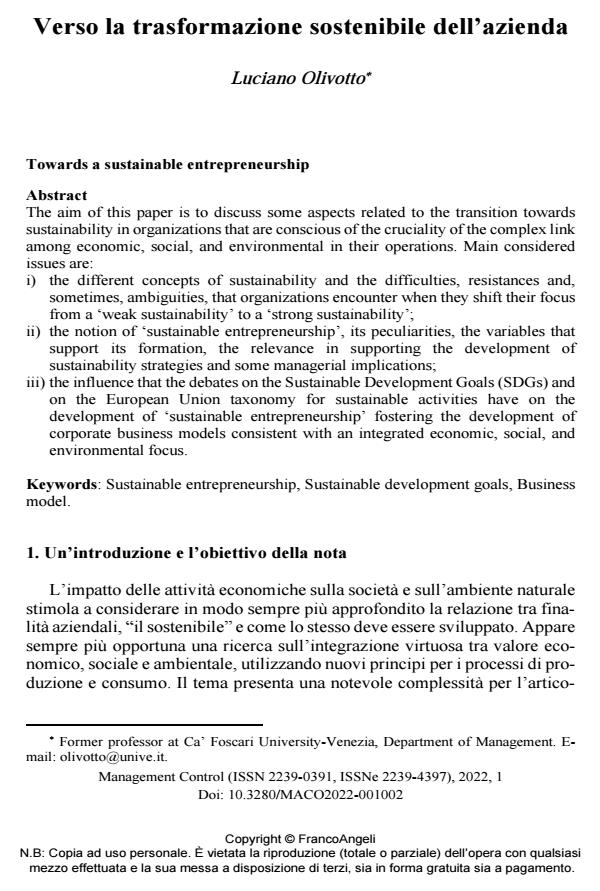Towards a sustainable entrepreneurship
Journal title MANAGEMENT CONTROL
Author/s Luciano Olivotto
Publishing Year 2022 Issue 2022/1
Language Italian Pages 14 P. 17-30 File size 203 KB
DOI 10.3280/MACO2022-001002
DOI is like a bar code for intellectual property: to have more infomation
click here
Below, you can see the article first page
If you want to buy this article in PDF format, you can do it, following the instructions to buy download credits

FrancoAngeli is member of Publishers International Linking Association, Inc (PILA), a not-for-profit association which run the CrossRef service enabling links to and from online scholarly content.
The aim of this paper is to discuss some aspects related to the transition towards sustainability in organizations that are conscious of the cruciality of the complex link among economic, social, and environmental in their operations. Main considered issues are:
i) the different concepts of sustainability and the difficulties, resistances and, sometimes, ambiguities, that organizations encounter when they shift their focus from a ‘weak sustainability’ to a ‘strong sustainability’;
ii) the notion of ‘sustainable entrepreneurship’, its peculiarities, the variables that support its formation, the relevance in supporting the development of sustainability strategies and some managerial implications;
iii) the influence that the debates on the Sustainable Development Goals (SDGs) and on the European Union taxonomy for sustainable activities have on the development of ‘sustainable entrepreneurship’ fostering the development of corporate business models consistent with an integrated economic, social, and environmental focus.
Keywords: Sustainable entrepreneurship, Sustainable development goals, Business model.
- Performance management systems for sustainability in SMEs: An interventionist approach Alessandra Buonasera, Guido Noto, Carlo Vermiglio, in MANAGEMENT CONTROL 3/2024 pp.39
DOI: 10.3280/MACO2024-003003 - Il contributo di Management Control alla ricerca su tecnologie digitali e sostenibilità Daniela Mancini, Domenica Lavorato, Palmira Piedepalumbo, in MANAGEMENT CONTROL 2/2023 pp.5
DOI: 10.3280/MACO2023-002001 - The effect of corporate governance on SDG performance of Italian listed companies Francesca Sgrò, Gail Denisse Chamochumbi Diaz, Federica Palazzi, Massimo Ciambotti, in MANAGEMENT CONTROL 1/2025 pp.111
DOI: 10.3280/MACO2025-001006 - Art, Culture and Made in Italy Palmira Piedepalumbo, pp.315 (ISBN:978-3-032-12527-9)
- Un modello sistemico delle relazioni tra azienda, biodiversità ed ecosistemi per gestire la performance ambientale Lino Cinquini, Giacomo Pigatto, Andrea Tenucci, Niccolò Braico, in MANAGEMENT CONTROL 2/2024 pp.161
DOI: 10.3280/MACO2024-002008 - Integrare gli SDG nella valutazione degli investimenti aziendali: risultati da un approccio interventista Giacomo Pigatto, Miriam Corrado, Lino Cinquini, Maria Serena Chiucchi, Andrea Tenucci, in MANAGEMENT CONTROL 2/2023 pp.69
DOI: 10.3280/MACO2023-002004 - "Radicare" la sostenibilità nella strategia attraverso i sistemi di management control: un caso di studio relativo ad una Pmi Armando Della Porta, Francesco De Luca, Chiara Aufiero, in MANAGEMENT CONTROL 2/2023 pp.43
DOI: 10.3280/MACO2023-002003 - Green innovation and financial performance. The role of R&D investments and ESG disclosure Raffaela Casciello, Rosalinda Santonastaso, Martina Prisco, Ilaria Martino, in Corporate Social Responsibility and Environmental Management /2024 pp.5372
DOI: 10.1002/csr.2862 - Management Control System in Smart and Sustainable Firms Domenica Lavorato, pp.1 (ISBN:978-3-031-81435-8)
Luciano Olivotto, Verso la trasformazione sostenibile dell’azienda in "MANAGEMENT CONTROL" 1/2022, pp 17-30, DOI: 10.3280/MACO2022-001002